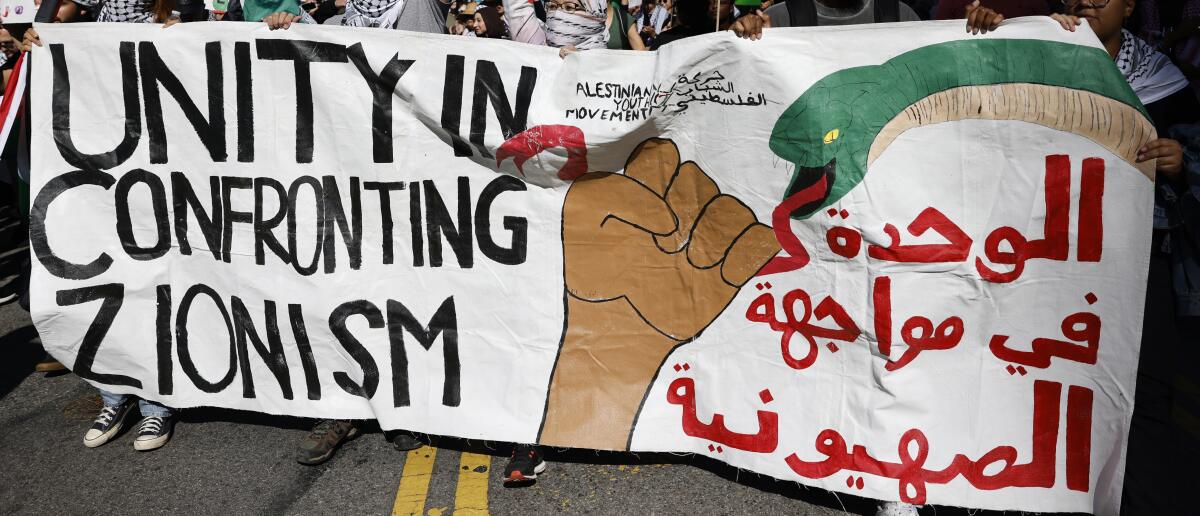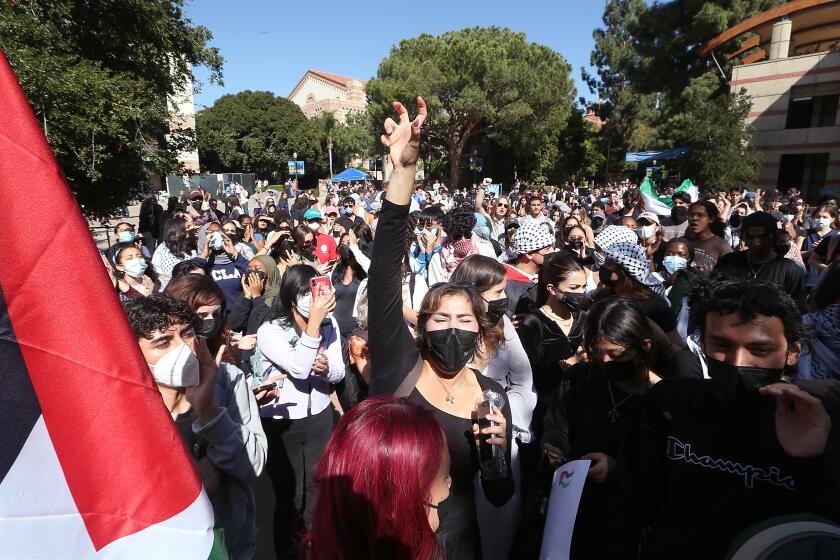Opinion: Nothing has prepared me for the antisemitism I see on college campuses now

I am a 70-year-old Jewish man, but never in my life have I seen or felt the antisemitism of the last few weeks. I have heard antisemitic things from time to time through my life. I remember as a child being called a “dirty Jew,” and my friends and I being called “Christ killers” as we walked to Hebrew school. I recall a college girlfriend’s parents telling her that she should not go out with me because “Jews are different.” I had an incident in a class I was teaching about the ethics of negotiations, where a student matter of factly said, “the other side will try to Jew you down,” without the slightest sense of how that was a slur.
But none of this prepared me for the last few weeks. On Friday, someone in my school posted on Instagram a picture of me with the caption, “Erwin Chemerinsky has taken an indefinite sabbatical from Berkeley Law to join the I.D.F.” Two weeks ago, at a town hall, a student told me that what would make her feel safe in the law school would be “to get rid of the Zionists.” I have heard several times that I have been called “part of a Zionist conspiracy,” which echoes of antisemitic tropes that have been expressed for centuries.
I was stunned when students across the country, including mine, immediately celebrated the Hamas terrorist attack in Israel on Oct. 7. Students for Justice in Palestine called the terror attack a “historic win” for the “Palestinian resistance.” A Columbia professor called the Hamas massacre “awesome” and a “stunning victory.” A Yale professor tweeted, “It’s been such an extraordinary day!” while calling Israel a “murderous, genocidal settler state.” A Chicago art professor posted a note reading, “Israelis are pigs. Savages. Very very bad people. Irredeemable excrement…. May they all rot in hell.” A UC Davis professor tweeted, “Zionist journalists … have houses w addresses, kids in school,” adding “they can fear their bosses, but they should fear us more.” There are, sadly, countless other examples.
No college student should be made to feel unsafe on campus. Most genuinely care about all civilians affected by the terror attack on Israel and the humanitarian crisis in Gaza.
How can anyone celebrate the killing of 260 people attending a music festival, or the brutal massacre of more than 100 people in a kibbutz, or the pulling of people from their houses to take as hostages? If this happened to people who were not Jews would there be such celebrations?
I have heard few campus administrators speak out publicly about the antisemitism that has become prevalent this month. They want to seem neutral or not be perceived as Islamophobic. I understand. I, too, refrained from speaking out against those who defended Hamas’ terrorist attack.
But when do we stop being silent and when do we say the antisemitism must be condemned and it is not acceptable on our campuses? I believe this must be that time.
Our close connection does not mean we agree on all aspects of the catastrophic situation in the Middle East. But the path to peace starts by not selectively grieving only those with whom we share religion or national origin.
To be clear, I — and I hope all of us — mourn the loss of life in Israel and in Gaza. There is surely room in our hearts to feel compassion for all who are in danger and all who have lost loved ones. But it is simply wrong to confuse condemning antisemitism with ignoring the plight of the Palestinians.
Of course, criticism of the Israeli government is not antisemitism, any more than criticizing the policies of the United States government is anti-American. I strongly oppose the policies of the Netanyahu government, favor full rights for Palestinians, and believe that there must be a two-state solution. But if you listen to what is being said on college campuses now, some of the loudest voices are not advocating for a change in Israeli policies, but are calling for an end to Israel. Students regularly chant, “from the river to the sea, Palestine will be free” and “We don’t want no two states, we want all of 48,” referring to going back to 1948 before Israel existed.
An oft-repeated mantra among some is that Israel is a settler colonialist country and should be forced to give the land back to the Palestinians. I have no idea how it would be determined who is rightly entitled to what land, but I do know that calling for the total elimination of Israel is antisemitic.
There has been enough silence and enough tolerance of antisemitism on college campuses. I call on my fellow university administrators to speak out and denounce the celebrations of Hamas and the blatant antisemitism that is being voiced.
Students have the right to say very offensive and even hateful things, but school administrators — deans, presidents and chancellors — have free speech rights too. They must exercise them and take a stand even if it will offend some and subject them to criticism.
It is a very difficult time on campuses across the country. Many of our students and faculty members have family and friends in Israel or in Gaza. Many care deeply about the suffering we are seeing, and yet there is no bridge between those who seek the elimination of Israel and those who believe it is essential to have a Jewish state. I hope there will be a time when campus officials can find ways to bring their communities together. But it is not realistic now. This makes it all the more important that they show moral leadership and speak out against the antisemitism that is rampant now, as they would condemn all other forms of racism and hate on campus.
Erwin Chemerinsky is a contributing writer to Opinion and the dean of the UC Berkeley School of Law. His latest book is “Worse Than Nothing: The Dangerous Fallacy of Originalism.”
More to Read
A cure for the common opinion
Get thought-provoking perspectives with our weekly newsletter.
You may occasionally receive promotional content from the Los Angeles Times.












